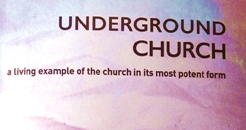 The Underground - 2
The Underground - 2
Following on from interest in the article, Repositioning church as a mission agency, one of the recommended books was Underground Church by Brian Sanders.
The book is the true story of a 10-year experiment that unpacks the possibilities of a church structured and streamlined for mission. Over the last ten years the church has been validating its ideas with sustained and growing results. At The Underground, being the church is not focused around a weekly gathering or church programmes, it's about empowering individuals to respond to God's call to ministry and mission, especially to the poor and disadvantaged in our midst.
While many churches talk about discerning calling and engaging in mission, very few are structured to make this their ministry focus. Underground Church is a new vision for the church rooted in its biblical mission to share the love of God and serve the poor. Brian Sanders explores how to make structural changes, how to think about leadership, how to fund ministries, and how to truly engage people in God's mission. With creative insights, he explains what it means to centre the mission of the church around the callings of individuals to outward ministry - whether that involves leading Bible studies in the workplace, feeding the homeless, or working to free women and children from sex trafficking.
I've picked some insights but every reader will find their own. Due to volume, these will be presented in a couple of posts. Part 1 is here. There could be more but you will need to buy the book!
Brian suggests that the prevailing church framework is almost entirely focused on the health and development of the people who attend it. Visitors are seen as sinners to be rehabilitated or as a mind whose ignorance needs to be dispelled. An overemphasis as a hospital for sinners and the power of the intellectual to do spiritual rehab. This potentially leads to a view that its people are sick and unhealthy and the leaders are experts who offer a treatment plan followed by healthy advice.
Churches therefore draw people into an educational environment with a bias for theory not practice. It creates an environment where gifted, higher capacity people do most of the work of ministry meeting the needs of the rest. People identify as sheep, have a poor view of themselves and therefore unable to do much of the 'real' work of ministry. Leaders function to tend the needs of the sheep to keep them gathered and stop them wandering. This leads to a centralised, building based model where success is the bigger classroom. Attempts to integrate mission into existing cultures and structures fail because those frameworks work against empowerment and innovation.
Brian realised that people were being underutilised and distracted by a system that maintains a large power distance between clergy/leaders and everyone else. So he thought about a new framework - an incubator for missionaries. A church made up of people who are all apostles (missionaries), its equippers (who are servants) and its infrastructure which is centrifugal (moving outwards). Equippers, therefore, need to help, empower and pledge to meet the needs of those who meet the needs of others.
This moves the Christian leader or pastor from a central role of master teacher to a peripheral role as servant and co-labourer in what the Father through his Holy Spirit is doing through each member of the family. Every believer is called to do the work of mission. They need to be empowered and released to engage the lost world, expanding the boundaries of the kingdom, served and supported by church leadership and their systems.
Christian leaders need to help believers find their calling that God has given to them and help them follow it through. Those believers will reach, equip and release more believers so there is a multiplying effect. The Underground are seeing a ratio of 10 staff (equippers) to 100 microchurch leaders (ministries they feel called to e.g. helping sex workers, homeless, refugees, etc.), who in turn have reached 1000 people.
The Underground now has over 100 microchurches across the city, each with its own distinct ministry - no two the same. The result of their experience is not so much what a church that tries to embrace mission can do, but what a group of people who conceive church in an entirely different way - from the vantage point of mission - can do. They've increasingly improved ways to give small start-ups of missional entrepreneurs what they need. Everything they do must be to help the microchurches grow and endure. They ask themselves everyday, "How can we better serve the microchurches?".
Staff has increased to 20 in 5 departments - each operating as team to support anyone engaged in mission. The 5 are; training, finance, coaching, facilities and media. Being a microchurch is the only qualification for getting support. So they can have an accounting department to handle their books, donations, expenses, payroll, etc. or a media department to create websites, videos, logo, printed items, etc. They will be assigned a coach. They can apply for grants, take up training, etc., as well as offices to work from, conference facilities, etc., if they need them. All overnight and all for free.
I think this gives you a taste of The Underground. Please buy the book to dig deeper and also watch this 35 minute documentary:
Retweet about this article:
Geoff Knott, 15/06/2021